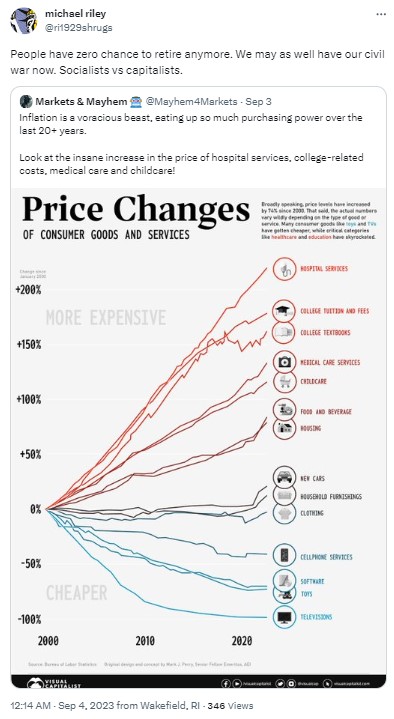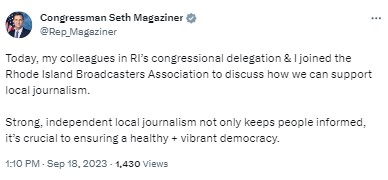Two implications of this recent tweet from Nicole Solas illustrate the danger that begins to fester when the institutions of a state become wholly partisan.

The first implication is that it will be very surprising if the attorney general or anybody else in Rhode Island law enforcement turns up the heat on a Democrat threatening a blacklisted conservative.
The second is, if anything, more disturbing. As somebody on the upper end of paying attention to happenings in Rhode Island, I’m surprised that I didn’t know about an assault on a sitting state senator that resulted in a probation. Searches on both Google and Bing produce zero results and, in fact, point instead to the incident in which Rogers knocked out an intruder in his home.
We’re not getting the news, in Rhode Island, and we therefore cannot be said to be making informed decisions during elections. Deepening the peculiarity is that controversies should be of interest to our fading news media. It’s like they’d rather destroy their business model then question the Party.
[Open full post]On WNRI 1380 AM/95.1 FM, John DePetro and Justin Katz discuss:
- Providence schools continue to fail and nobody asks the right questions
- Magaziner jumps right into the partisan spokesman role
- Leonard lets the election pass him by (without a base)
- Illegal immigration simmers at the edge of mainstream awareness
- Curious incuriosity in the media about mail ballots
Featured image by Justin Katz using Firefly.
[Open full post]Rhode Island investment expert Michael Riley tweeted a chart recently that rewards closer analysis:

Notice a common theme dividing everything above and below “food and beverage”? Actually, everything from “housing” up is heavily subsidized, in one way or another, by government, while everything below is not. Basic economics should lead us to expect that subsidizing things increases the price.
[Open full post]I know of at least one Massachusetts town where these new residents are about to enter an understaffed school system en masse. Even more, they are getting free preschool and free transportation to preschool, which for residents is an additional cost that some are deciding is too expensive.

We need to understand — and explain to our neighbors as they begin to wonder what’s going on — that Northeastern governments (led by Democrats) don’t think they need us, and they therefor do not represent us. They want to import clients for their services for which they can then seek to bill other people.
This scheme may have worked for a very small number of cities (like Lawrence, MA), but when whole states are scrounging around for people to pay for the services to which officials have committed, people will begin to say “no” in one way or another.
[Open full post]Doublespeak such as that used by Democrat Congressman Seth Magaziner in the following tweet has become so common that we hardly notice it. He (or a staffer who wrote the post) may not even realize the problem with the word choice (which would make it doublethink, I suppose):

If government supports journalism, it is by definition not independent. That word, “independent,” may still have a salutary ring in Americans’ ears, but one suspects what Rhode Island’s all-Democrat delegation actually wants is a local media that handles them favorably, or at least carefully, because they are its benefactors.
[Open full post]As is increasingly required, Nicole Solas has gone outside of Rhode Island to bring attention to a problem within the state, writing in Daily Caller:
I pay my pediatrician for check-ups and throat cultures, not ideological finger-wagging about sex education in kindergarten. But at that moment I realized that gender ideology in medicine and education was not about the health and safety of children. It is about people abusing their positions of power to tell parents how to raise their children. It is about authoritarianism.
Blue Cross Blue Shield of Rhode Island offers “safe zone training” for healthcare providers, and these stickers identify compliant providers. Critics argue these stickers are mere reassurances of “inclusion,” but my former pediatrician told me the stickers are meant to start conversations with children about gender ideology.
This is straightforward ideological capture of crucial service institutions. Cult-like ideologues take over key corporate departments, government agencies, and independent associations and push their beliefs down to practitioners.
Nobody should doubt that progressives, even quite mainstream and “moderate” ones, will talk themselves into believing the suffering, and even death, of some children is justified in the service of “inclusion,” which has rapidly come to mean “exclusion of noncompliant people.”
[Open full post]On WNRI 1380 AM/95.1 FM, John DePetro and Justin Katz discuss:
- Much ado about the Independent Man
- What’s the plan for Matos?
- The quiet general election for CD1
- Park Theater socialism
- Rights for the Left but not for thee
- Media blacklisting of Solas
- Looters after the flood
- Neronha speculation
Featured image by Justin Katz using Dall-E 2.
[Open full post]Current Rhode Island public school policy on transgender and gender nonconforming students was formally passed as a regulation in April 2018 by the Council on Elementary and Secondary Education and then-Education Commissioner Ken Wagner under the authority of the governor.
Anchor Rising made the following inquiry by e-mail last month of the Rhode Island Council on Elementary and Secondary Education, current Education Commissioner Angelica Infante-Green and Governor Dan McKee through his Press Secretary.
Current RIDE policy permits schools to discuss transgender procedures with students. RIDE policy also permits schools to refrain from notifying the parents of students at the secondary level who may be considering or are undergoing gender transition. My question: is RIDE considering changes to these policies given the increasing publicity around “detransitioners”?
No response has been received, though staff members of all three offices politely indicated in follow up calls they would pass along the inquiry.
The effects of transitioning – sterility and non-functional organs – are significant and permanent as the thousands of transgender individuals who detransitioned (the 2015 U.S. Transgender Survey alone documents 2,242 individuals who have done so; how many since?) have learned. And the stories of an increasing number of detransitioners have been in the news recently.
Rhode Island’s transgender policy on underage students, accordingly, is consequential and carries potential long-term implications for at least some of the students in our elementary and secondary schools. For this reason, Anchor Rising will make follow up inquiries of the above officials.
[Featured image by Kenny Eliason via Unsplash]
On WNRI 1380 AM/95.1 FM, John DePetro and Justin Katz discuss:
- Ana Quezada gives RI advanced warning of the mail-ballot calamity
- The painters’ union finds (lead) dirt on its competition
- Local newspapers run into the problem of losing audience and revenue
- The “sanctuary city” label becomes less fun
- Flooding becomes more common
- Rob Cote gets the mic, but not justice
- (Most) Democrats come together
- School kids (still) don’t like school food (even as they’re prepped to look for handouts)
Featured image from Shutterstock.
[Open full post]On WNRI 1380 AM/95.1 FM, John DePetro and Justin Katz discuss:
- WPRI rehabilitates Crowley
- Identity politics in CD1
- Polling and media endorsements in CD1
- Giant fake stuffies
Featured image by Justin Katz using DALL-E 2.
[Open full post]





